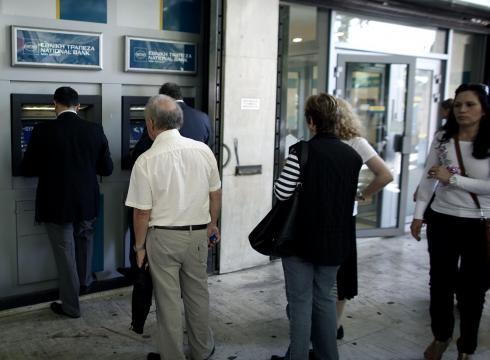USA Today
5/17/2012
By Nikolia Apostolou
and Renuka Rayasam
(Rayasam reported from Berlin)

People withdraw money from a branch of the National Bank of Greece in central Athens on
May 17, 2012. (Angelos Tzortzinis, AFP/Getty Images)
ATHENS, Greece – Worried for the future, Greeks are pulling money out of banks at an increasing rate and either transferring it abroad, when they can or hiding it at home.
"I know a lot of people, who have drawn their money from the bank", said Apostolis Manafas 57, unemployed, of Athens. "I have friends, that even hide their money in their closets. It reminds me of our grandparents and old Greek movies, where people sewed their savings in their mattresses."
Greeks withdrew more, than $900 million Monday and another $600 million Tuesday according to the Greek Central Bank. While deposits have been steadily leaving banks since the start of the country's debt problems in 2009, this week's outpouring of cash reflects a new level of panic, analysts say.
Meanwhile in Spain the newspaper El Mundo said, customers have withdrawn more, than €1 billion ($1.27 billion), since the state took over Bankia, the country's fourth-largest lender, a week ago. Bankia insisted, its depositors' money was safe and the government denied, there was a run on the bank.
The withdrawals in Greece follow that country's failure to form a unity government after recent elections. A coalition of leftists insisted, the country refuse to enact budget cuts agreed to by the previous government, in order to qualify for billions of dollars in debt relief from Europe and the International Monetary Fund.
Greece's caretaker Cabinet was sworn in Thursday and will lead the country into a new election June 17.
Some Greeks fear, the fight against austerity could force Greece out of the 17-member eurozone of nations, that use the euro as currency and require the country to return to the drachma, the previous Greek currency, that would likely be worth far less, than euros.
"It's a game of chicken between the EU and Greece", says Raoul Ruparel, head of economic research at Open Europe, a London based think tank.
Ruparel says, new elections may give one side the political majority to take action. But until then "It leaves [Greeks] in a very uncertain position. As long, as this is going on, there is a cloud hanging over Greece as a whole."
Margarita Manousou, editor of a Greek tourism publication in Athens, says, most Greeks want to remain in the eurozone, but are worried about being punished by the European Union for objecting to what they consider harsh cuts in public benefits and welfare demanded by terms of a debt bailout.
"People are scared, they will lose their money", she said.
The EU has threatened to withhold further bailout loans, if Greeks elect a government, that opposes the bailout's austerity measures.
Bank withdrawals seem to mirror the mood of the country at various points.
Deposit outflows have averaged between $2.5 billion and $3.8 billion a month, some of that from unemployed Greeks drawing down their savings. But in March and April, after Greek's international lenders agreed to fund bank recapitalization, Greeks put $2.5 billion back into their accounts.
For a while in the spring things were looking up, says Stathis Christophi, associate director of global banking at HSBC in London. "But now it is a really bad situation", he said. Originally from Greece, Christophi said, even he had a former colleague call this week asking, how to open a bank account in London. He says, wealthy friends are buying property abroad or moving money, where they can. "The whole banking system is paralyzed", Christophi said.
The more money, that leaves, the more Greece is dependent on the EU, says Ruparel. And the EU will continue to demand political and economic reforms in return for additional funds. It's a contradiction, that will continue the country's tailspin, until it can gain more secure footing.
Greece is in its fifth year of depression and its economy has contracted 22% in that period, while unemployment has soared to 21%. In spite of two approved bailouts, the last in March, as well as a shaving of its debt, the economic crisis in the country hasn't eased.
So for now, withdrawing money from bank accounts "is a natural response, when you are [being] blackmailed", says Manousou. "The choice is: either you vote right wing, or Europe will take away your money."